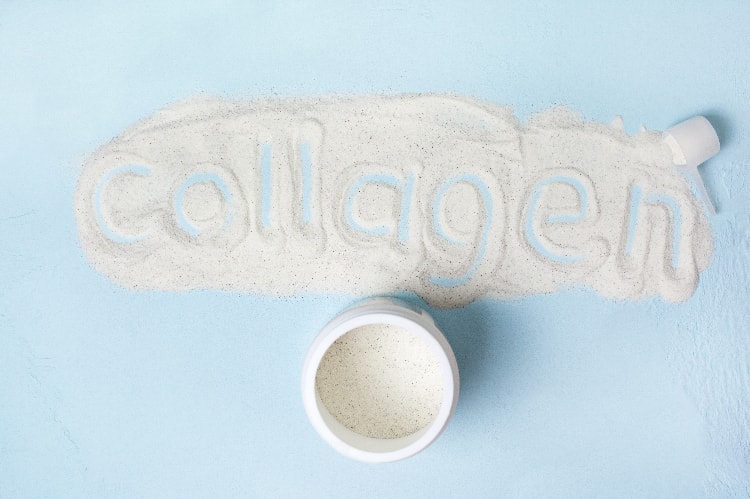
Collagen is the most abundant protein in the body. It’s the main building block of skin, muscles, bones, blood vessels, gut tissue and tendons. Yet, as we age our bodies start to produce less of this important protein. So then, how can you boost collagen naturally to maintain beautiful skin and a healthy body?
Well, that’s what we’re going to look at today!
This post breaks down:
- The key benefits of collagen.
- How to increase your body’s collagen production naturally.
- The things you can do to prevent collagen loss.
- What you should know about collagen supplements.
To kick things off, let’s look at how the body uses collagen.
Note: this post contains affiliate and I earn a commission (at no additional cost to you) if you use them to make a purchase
BENEFITS OF COLLAGEN AND HOW YOUR BODY USES IT
1. Reduces The Appearance Of Cellulite And Stretch Marks
Healthy skin, whether on the face or body, should be firm yet elastic (or flexible).
However, with age, skin loses its elasticity and becomes thinner.
And thinner skin is more prone to showing wrinkles, cellulite and stretch marks.
Thankfully, collagen can improve all of this because it’s essential for maintaining your skin’s connective tissue.
By getting more collagen into your body, your skin looks firmer, smoother and healthier (source).
2. Improves The Health Of Hair And Nails
All hair strands – whether straight, curly, kinky, wavy or something in between – are made of a protein called keratin.
And in order to make a protein like keratin, your body uses the amino acids, which are the building block of proteins.
So, when you consume more collagen or increase your production of collagen, your body breaks it down to its individual amino acids.
And then it uses those amino acids to build keratin (and any other proteins that it needs to build)!
As for nails, research shows that collagen can also help improve nail growth and brittle nails (source).
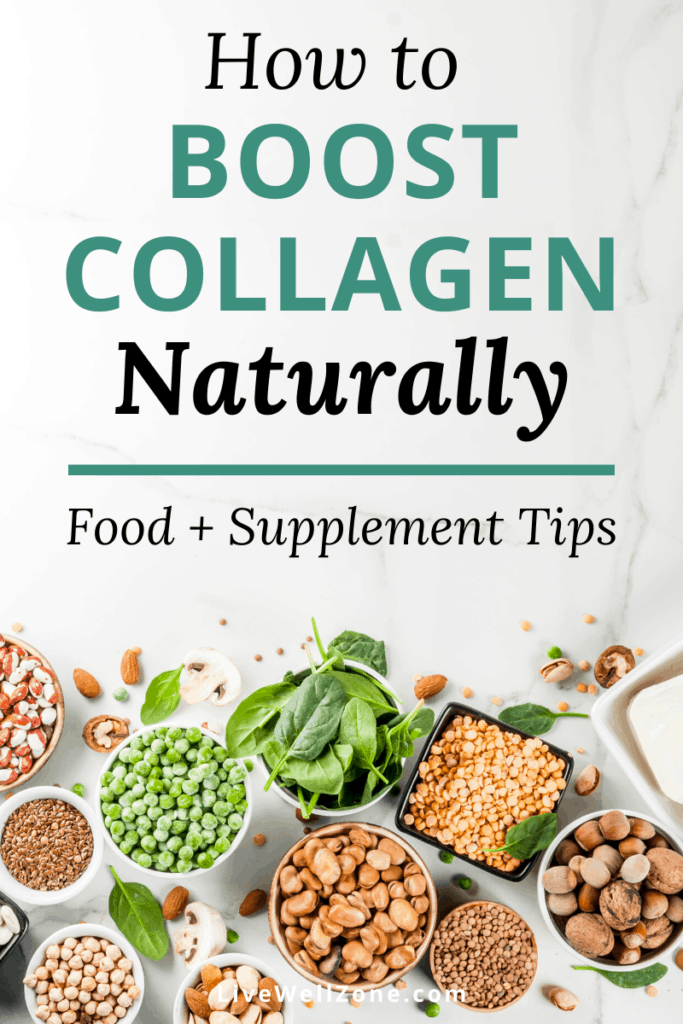
3. Heals Leaky Gut and Balances Hormones
Leaky gut syndrome occurs when the tight matrix or tissue that lines the digestive tract becomes weak.
When this lining becomes weak, it develops holes or gaps that make it easy for undigested food particles, toxins and microbes to seep through.
Ultimately leaky gut creates an inflammatory state that contributes to hormonal imbalances, fatigue, bloating, acne and may other symptoms.
So, how does collagen fit into all this?
Well, your gut lining is made primarily of collagen.
This means that the more collagen you make (or consume) the greater your chances of reversing leaky gut, hormonal imbalance and related symptoms.
4. Supports Heart Health
Collagen plays a role in controlling blood pressure, minimizing fat accumulation in the arteries, relaxing blood vessels, and preventing the buildup of plaque in the arteries.
This is mainly because collagen is a major component of your arteries (which carry blood from the heart and sends it out to the rest of the body).
When your body is low on collagen, your arteries become weak, ultimately leading to conditions like atherosclerosis (narrowing and stiffening of the arteries).
Here again, collagen can help a lot. In fact, one study showed that supplementing with collagen results in a significant improvement in arterial stiffness
5. Reduces Joint Pain and Joint Damage
Lack of collagen makes it difficult for your tendons and ligaments to move easily.
And in the long run, this causes stiff and swollen joints.
Collagen is an excellent remedy for this because it has a smooth, gel-like structure.
With the right levels of collagen in your joints, it becomes much easier to maintain overall healthy bones and to move without feeling pain.
3 WAYS TO INCREASE COLLAGEN NATURALLY
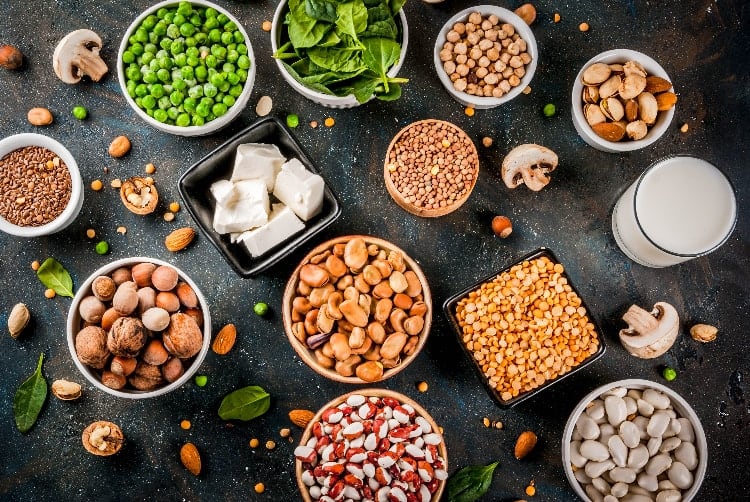
1. Eat A Variety of Proteins
Collagen is a protein. And in order to make a protein your body needs amino acids.
The best way to get more of those amino acids is to eat protein-rich foods.
And since different foods have different amino acids, it’s a good idea to eat a variety of protein-rich foods.
So, this means both plant and animal sources of protein.
Generally speaking, animal protein is considered a complete protein because it contains all the amino acids we need.
Meanwhile, plant proteins don’t always have all the amino acids…except for quinoa.
Quinoa is one plant source of protein that contains all the amino acids and therefore, it’s a complete protein.
I always recommend eating more plant-based proteins because unlike beef and other types of meat, plants are anti-inflammatory.
Also, plants come with vitamins and minerals that your body needs to make collagen (you simply can’t get the spectrum of essential vitamins or minerals that you need from any meats).
Protein sources to consume: quinoa, raw nuts and seeds, nut butters, legumes (beans, lentils, chickpeas), meats (sparingly).
2. Get Sufficient Amounts Of Vitamins and Minerals
Aside from amino acids, the body relies on vitamins and minerals to make collagen.
One of the most important of those vitamins is vitamin C.
Without enough vitamin C, you literally cannot make the collagen you need.
In addition to vitamin C, minerals like zinc, copper and sulfur are also necessary for collagen production (1, 2, 3).
Vitamin C sources: citrus fruits, bell peppers, dark leafy greens, berries, tomatoes.
Zinc sources: raw nuts and seeds (walnuts, almonds, pumpkin, flax seeds, and so on), cacao powder (and dark chocolate with 70% or more cacao content).
Copper sources: avocados, shiitake mushrooms, potatoes with the skin.
Sulfur sources: garlic, eggs, cruciferous veggies (kale, cauliflower, broccoli, radishes, arugula, collard greens and so on).
3. Take A Collagen Supplement
Another way to “make” more collagen is to simply take a collagen supplement.
We’ll talk a little more about supplements at the end of this article, but for now, be aware that the jury is still out on collagen supplements.
There doesn’t seem to be any harm in taking them.
However, experts think that simply eating healthy sources of protein is enough to give your body what it needs (source).
20 FOODS THAT HELP PRODUCE COLLAGEN
Based on strategies we discussed in the previous section, here are 20 healthy foods that you can use to support your body in making collagen.
- Avocados
- Legumes such as chickpeas, lentils and beans
- Dark leafy greens
- Tomatoes
- Citrus fruits like lemons, limes, oranges and grapefruits
- Bell peppers
- Berries such as strawberries, raspberries, blueberries and blackberries
- Cacao powder
- Dark chocolate (at least 70% cacao content)
- Garlic
- Omega-3 rich fish like salmon, mackerel and tuna
- Bone broth
- Nuts and seeds like walnuts, almonds, hemp seeds, sesame seeds and sunflower seeds
- Cruciferous veggies like broccoli, cabbage and cauliflower
- Eggs
- Quinoa
- Spirulina
- Chlorella
- Shiitake mushrooms
- Potatoes
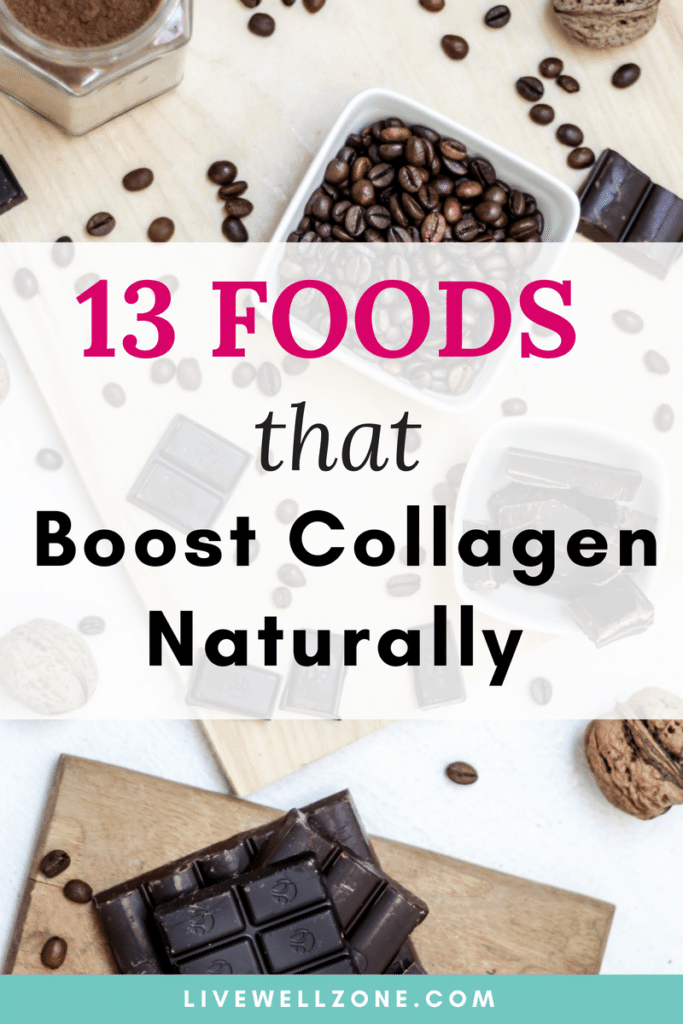
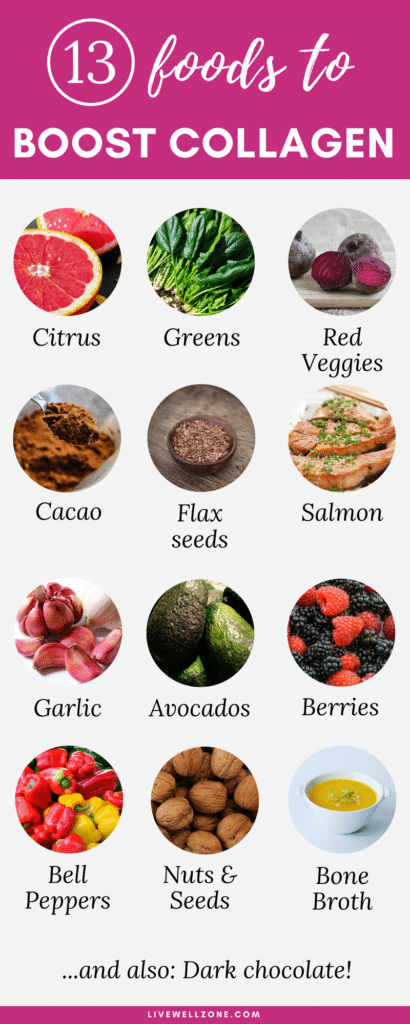
HOW TO STOP COLLAGEN LOSS
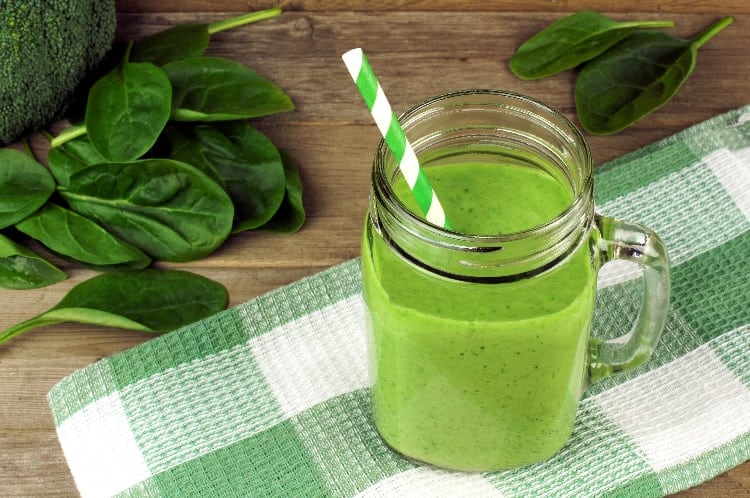
Even though collagen production is said to decline as we age, the one thing that really speeds it up is our dietary and lifestyle choices.
Excessive levels of stress and toxins uses up more collagen.
Stress also uses up your vitamin C stores like crazy! And as we’ve seen, you need vitamin C to make collagen.
So, with that in mind, here are some dietary and lifestyle habits that will help prevent collagen loss:
- Quit smoking.
- Eat more antioxidant-rich foods (to help fix the damage caused by things like smoking).
- Avoid excess consumption of refined or processed foods.
- Eat more whole and anti-inflammatory foods.
- Develop a self-care routine that helps you lower stress (here are some resources on self care).
- Use more natural, non toxic makeup and skincare products (to avoid the chemical stress caused by many toxins in mainstream products).
- Eat more chlorophyll rich foods (i.e. leafy greens) to help you get rid of toxins that worsen collagen loss. Smoothies are an easy way to get more greens in your diet and you can use this guide to making green smoothies to help you.
- Make sure to maintain healthy levels of vitamin D because it helps lower inflammation. The best option here is to get at least 20 minutes of sunlight each day (about an hour if you have dark skin). And this time in the sun should be without sunscreen.
WHAT TO LOOK FOR WHEN BUYING COLLAGEN SUPPLEMENTS OR COLLAGEN POWDER
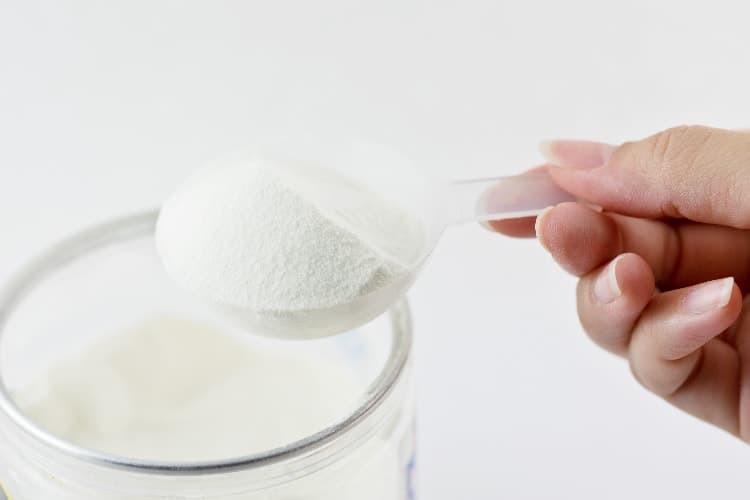
Even though there are studies showing that collagen supplements can improve our health, there are concerns when it comes to the quality of these supplements.
You see, most collagen powders are made from chicken, pig or cow parts (and sometimes, fish).
We’re talking ground up hooves, bones or nerve tissues from those animals.
The main worry here is that the parts used can carry contaminants, heavy metals and diseases (mad cow disease, for example).
Plus, animals are often fed lots of hormones, antibiotics and other things that can end up in the supplement.
So, if you choose to use a collagen supplement, use the following tips to ensure you’re getting a good product:
- Prioritize quality over price.
- Choose a powder that is made from organic, grass-fed cows.
- Check the color and smell. If you buy plain, unflavored collagen it should be colorless and pretty much tasteless. If it looks off-color (brown or yellow) then you’re likely not getting the best quality.
- Pay attention to the collagen “type.” Collagen in the body is broken down into various categories. The table below shows you a few of them (4, 5).
| COLLAGEN TYPE | BENEFITS/USES |
|---|---|
| Type I | 90% of our collagen is Type I. Great for skin, bones, tendons, gut, ligaments, organs and teeth. |
| Type II | Builds cartilage and protects your joints. |
| Type III | Necessary for blood vessels and heart tissue. Also supports muscles and organs. |
| Type IV | Found in basal lamina, which is a thin, gel-like layer that surrounds our organs, muscle and fat. |
| Type V (5) | Necessary for hair strands, making the surface layer of cells and placenta tissue. |
| Type X (10) | Helps with making new bones and healing fractured bones. |
Collagen supplements list the type(s) that are in the powder.
If you have a specific need, then you can buy a powder that lists the types that match need.
However, to cover all your needs, you’re better off buying a supplement that has multiple types.
One powder that checks all the boxes is this Multi Collagen Protein Powder from Ancient Nutrition
This particular powder contains all the different collagen types, plus it’s made from animals that are pasture-raised, free of hormones and free of other chemicals.
In addition, this formula contains fish collagen (from sustainably-sourced fish).
CONCLUSION
So that does it for collagen and what you can do to boost it naturally!
As you can see, every part of the body relies on this essential protein.
And the great thing is that you don’t need to pull any special tricks to get more collagen.
Just by eating more of the wholesome foods listed in this article, you can support your body in maintaining healthy levels of collagen.
If you have any questions or feedback about this topic, feel free to drop a comment below.
Related Posts:

